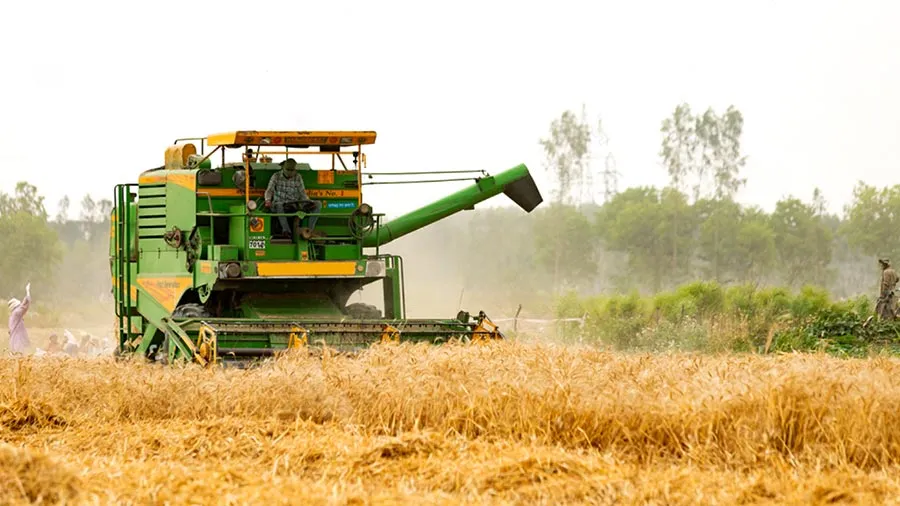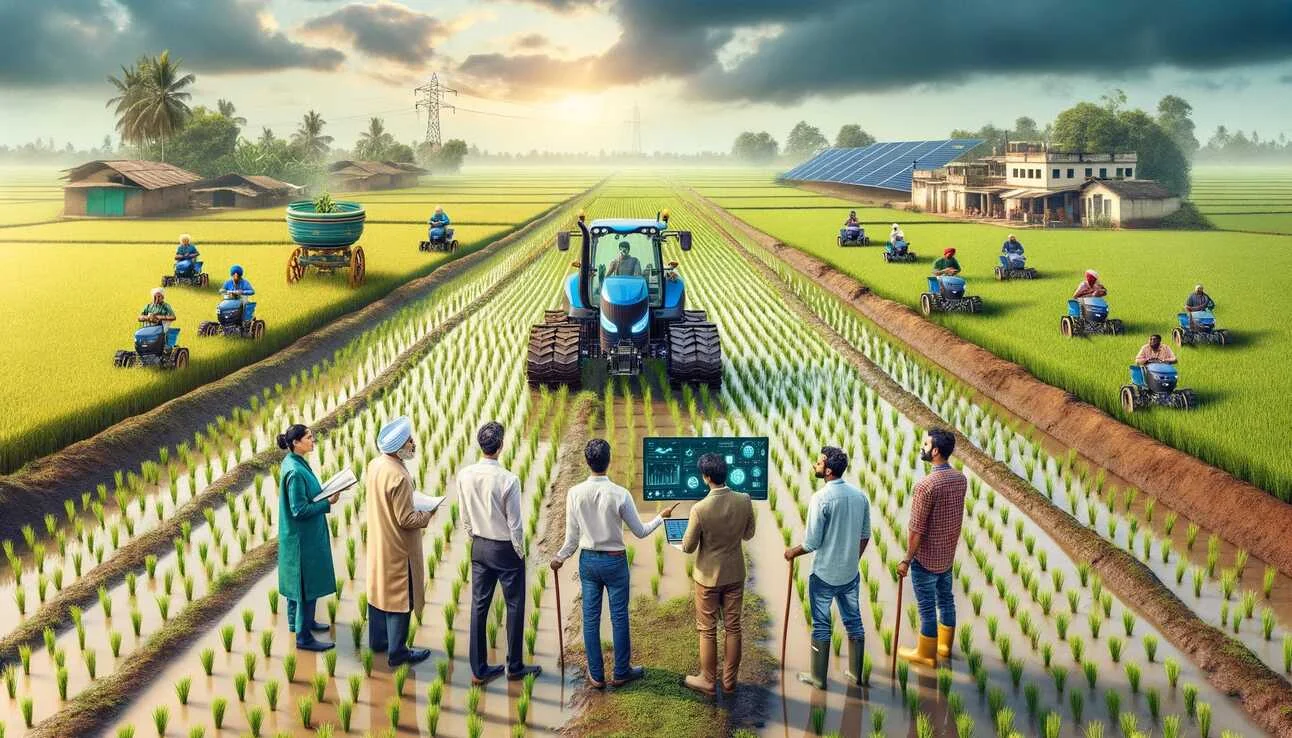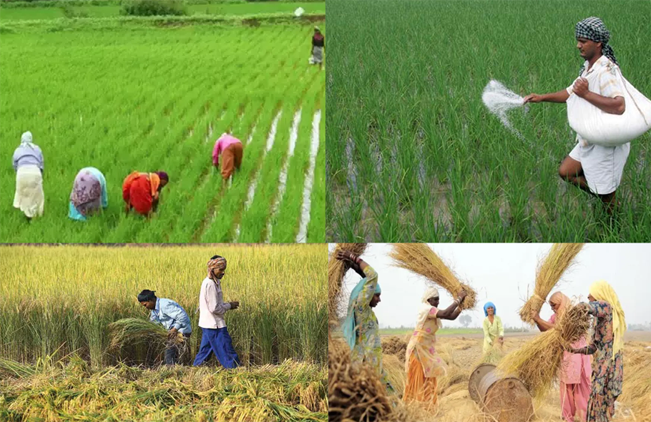Trends, opportunities and challenges of farm mechanization in India: Agricultural mechanization in India has been a transformative development in agriculture, changing the way farmers approach their daily activities. With the growing demand for increased agricultural productivity and efficiency, mechanization has emerged as a key tool to meet these needs. However, while the benefits of farm mechanization are clear, it also brings with it a number of challenges that need to be addressed. In this article, we will explore the trends, opportunities, and challenges of farm mechanization in India.
Trends in Farm Mechanization in India:

- Increased Adoption of Tractors and Combine Harvesters
Over the past decade, the use of tractors and combine harvesters in India has increased significantly. These machines help farmers manage large tracts of land more efficiently, reducing the time and effort required for plowing, sowing, and harvesting. The increase in mechanization is needed to improve productivity, reduce labor costs, and eliminate the shortage of manual labor in rural areas.
- Growth in Specialized Farm Equipment
The trend of adopting specialized farm equipment such as seeders, planters, tillers and irrigation systems is continuously increasing. These machines are designed to meet the specific needs of different types of crops and are crucial for increasing efficiency at different stages of crop production. The availability of suitable machines for small, medium and large-scale farms has made farm mechanization more accessible to a wider range of farmers.
- Government support and subsidies
The Government of India has recognized the importance of farm mechanization in increasing agricultural productivity and has launched various schemes to promote its adoption. Programmes like the Sub-Mission for Agricultural Mechanization (SMAM) provide subsidies to farmers for purchasing machinery. This government initiative aims to make farm mechanization affordable for farmers, especially for the underprivileged and smallholder communities.
- Growing demand for precision agriculture
Another emerging trend in farm mechanization is the adoption of precision agriculture, which uses technology to optimize the efficiency of inputs such as water, fertilizers and seeds. Tractors and drones equipped with GPS technology, sensors and data analytics are helping farmers monitor crop health, detect pest infestations and apply inputs more effectively. Precision agriculture has the potential to revolutionize farming practices by making them more sustainable and cost-effective.
Opportunities for farm mechanization:
- Increased productivity and efficiency
Agricultural mechanization plays a vital role in increasing agricultural productivity. By replacing manual labor with machinery, farmers can complete tasks like tillage, planting and harvesting more efficiently, thereby increasing overall production. This, in turn, helps meet the growing food demand in India, which is projected to increase due to population growth.
- Increased profitability for farmers
Mechanization can help farmers reduce their labor costs and increase productivity. With the introduction of mechanized agricultural equipment, farmers can achieve better yields, reduce wastage and increase their profits. Additionally, machinery such as combine harvesters allow farmers to harvest crops faster, thereby reducing crop losses due to delays.
- Employment opportunities in machinery manufacturing and maintenance
The growing demand for farm machinery also presents employment opportunities in the machinery manufacturing, sales and maintenance sectors. Local production of farm equipment has gained momentum, which has boosted the economy and created jobs in rural areas. Skilled technicians and service providers are in demand to ensure the proper functioning and maintenance of machines.
- Sustainability and environmental benefits
Farm mechanization, especially when integrated with precision agriculture technologies, can promote sustainable farming practices. Machines that optimize the use of water, fertilizers and pesticides help reduce environmental degradation and improve soil health, contributing to long-term sustainability in agriculture.
Challenges in Farm Mechanization:

- High Initial Investment and Capability
A major challenge hindering the widespread adoption of farm mechanization in India is the high cost of machinery. Smallholder farmers, who constitute a significant portion of the agricultural workforce, often find it difficult to afford mechanized equipment. Although government subsidies exist, they are not always sufficient to bridge the affordability gap, especially in rural areas where access to finance is limited.
- Lack of Awareness and Training
Another challenge is the lack of awareness and technical knowledge among farmers about the benefits and operation of modern agricultural machinery. Many farmers are hesitant to adopt mechanization due to a lack of understanding of its potential. There is a need for better training programs to educate farmers on the effective use of machinery and technology.
- Fragmented Land Holdings
Indian agriculture is characterized by small and fragmented land holdings, which makes it difficult to effectively use large machinery. Farmers with small plots may not find it cost-effective to invest in large machines. While solutions such as custom recruitment centers and community-based mechanization models are emerging, overcoming this challenge requires a change in how machinery is distributed and used in rural areas.
- Limited Infrastructure for Machine Maintenance and Repair
Another significant challenge is the inadequate infrastructure for machine repair and maintenance in rural areas. Farmers often face difficulties in accessing reliable repair services, which can lead to prolonged downtime and reduced productivity. This issue highlights the need for a robust network of service centers to support the growing number of mechanized farms.
Agricultural mechanization has immense potential to revolutionize Indian agriculture by improving productivity, profitability, and sustainability. Despite significant opportunities such as increased efficiency, increased profits, and environmental benefits, challenges, particularly related to affordability, awareness, and infrastructure, need to be addressed to ensure that mechanization reaches all corners of the country. With continued government support, technological advancements, and a focus on rural development, farm mechanization in India has a bright future.
Read Also: How Technology is Transforming Indian Agriculture
![]()





